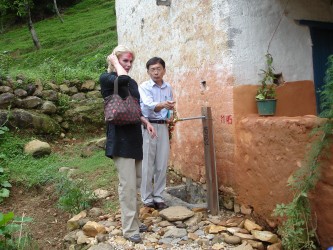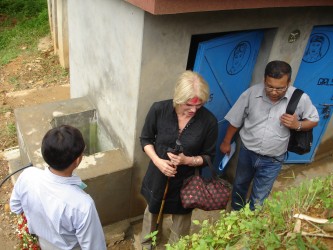
Just in case you’ve missed it - Joanna Lumley is in Nepal this week! She’s been called a “Goddess of Nepal”, and has arrived for the first time to meet Gurkhas and their families, for whom she has campaigned so successfully. I met her earlier this week and she’s lovely – down to earth and charming!
Here’s a photo of us at the British Embassy. Anyway, celeb-fever aside, while she’s here, we also took the opportunity to show her a little of what DFID is doing here to improve the lives of poor people. As her main interest on this trip is specifically the welfare of Gurkhas and their communities, we showed her some of the work we have been doing for the past 20 years in support of the Gurkha Welfare Scheme (GWS).

Joanna (I take the liberty to be on first name terms) went to see the Chaura water project near Pokhara in central Nepal. Here she is by a temporary tap with Captain Bhakta Bahadur Rai, the GWS Programme Director. DFID has invested around £14 million in projects such as these, building over 800 rural water and sanitation schemes, which we estimate will have benefited more than 160,000 people. We are working on nearly 160 new schemes, which we hope will reach an additional 33,000 people in rural areas. Water is of course important not only as a safe source of drinking water, but also to improve hygiene and prevent disease. It also saves time, as it is often women and children who have to spend sometimes several hours a day going back and forth up and down mountains to fetch water. That time can now be spent more productively going to school or working in agriculture or small-scale businesses to increase their income. So the benefits are significant.

The Gurkha Welfare Scheme also helps renovate and build schools and bridges. Joanna got to visit the newly-built school toilets with our Infrastructure Advisor, Chandra Shrestha, on the right of the photo. Clean and safe toilets make a huge difference to girls’ attendance in school. The Scheme also provides medical care to remote areas - about 14,500 people received medical assistance through the scheme in last year. And when we say remote, we mean remote. The doctors and medical staff that provide this service sometimes need to walk for days to reach the communities they are serving.
Of course, Gurkhas do not live in tightly defined, ring-fenced communities, so our programmes will also of course benefit the wider rural community. And support we have provided to rural communities in Nepal, will also have benefited Gurkha communities as well. So facilities such as over 200 health posts and 20,000 toilets in remote areas, 2,500 schools or community centres and safe drinking water for around 75,000 households which we have built through our Community Support Programme will also have benefited Gurkha communities. As does our support to health and education across all of Nepal. The fact that there is peace in the country also makes a huge difference to people’s lives, and the UK is supporting the peace process, both politically and where we can, financially (for instance, through our support of the 2008 elections).
This trip for Joanna is quite rightly very focussed on the Gurkhas. But we would like to invite Joanna to come back to Nepal to see more of the country and to see what the UK, through DFID, is doing to help people here. It would be a huge boost for development in Nepal – she is not only a Goddess for Gurkhas, but for the whole of Nepal. So here’s hoping we can make that happen!

9 comments
Comment by Shiva Prasad Aryal posted on
Dear Sarah,
I fully agree with you on how important the bridges, particularly trail bridges are to bring positive changes in the life of Nepali people living in the remote villages.
Your views are very rewarding and encouraging to me and all the staffs of Helvetas, particularly the staffs, who are directly involved in supporting communities, NGOs and the Government to build many trail bridges in Nepal.
Shiva,
Country Programme Director
Helvetas, Nepal
Comment by Nimesh Tamrakar posted on
Dear sarah,
As being nepali, I can understand how much she had help us in fighting gurkhas voice. We appreciate much her involment thats way she called goddess of nepal.
And as well its much more appriciating and rewarding job doing by DFID in developing villages of nepal. It encourages me that like your organization not only developing fundamental infrastructures in remote also helping to get educate the remote people. Because the way to develop nepal is ony by working in a group stakeholders and people of nepal. It only possilbe when the people of nepal get educate.
Nimesh
Nepal Engineers' Association
Doha
Comment by Nisha Neupane posted on
Hi Sarah,
This is awesome! I am very much impressed reading what DFID is doing for us. I know, DFID does a lot at the grassroot level from my past experience having worked with Nepal-UK Forestry Program and later with Livelihood and Forestry Program, however, in between, I had understood that there were some shorfall in supporting Nepal, could be, because of political distrubances or whatever reason. But, now, I am tremendously happy that DFID is still working in its full spirit to help develop Nepal and Nepalese. I am dreaming to see my country people 100% educated and civilized one-day. I have a request to you and DFID to have a priority program to educate our leaders first. It make us feel so bad when our so-called leaders speak without a little common sense, and just fighting for power & chairs only. We need to educate Nepali people to kick off the rotten leaders and elect the right ones to lead the country. So, a real governance program is highly required in this country. We need a real leader who loves and cares about Nepal and Nepalese without any selfishness! We need to generate sufficient employment opportunities for the young graduates and mobelize their innovative talent.
I really appreciate and thanked you and the DFID team working hard for our betterment.
Nisha
USA
Comment by Mochi Sada posted on
There is no dought on DFID improtant contribution in the development of Nepal. But think and examine your efforts through using the eye of voiceless and marginalized people. All these important projects are run and managed by only high class Bahun and Chetri managers. They control all power and resources of DFID. When they go in negotiation with organizations of marginalized people, they only pour their mercy on these people. They can not understand the thrust of DFID nor the marginalized perception.
England is indebted of Gurkhas in many ways, all know. But Janajati communities share in DFID Nepal's office is very poor. How can Janajati people expect their betterment from the Bahun managers of DFID Nepal office? It is good time to address grievances of Janajatis and most marginalized Dalits. Can you initiate progress in this direction to better satisfy Lumel's spirit?
Best wishes.
Comment by garth grange posted on
Congratulations to Joanna for winning a very worthy batte. The ghurkas are great people and we are glad to welcome them here.
However, now the battle has been won, let's win the peace. Some good people have applied for work, they speak English and are honest and well behaved, but unfortunately they do not read and write, and know little of computers. How about informing them on how to go on numlit courses.
Please do.
Thanks.
Comment by Nisha Neupane posted on
Hi Sarah,
I would love to read more on DFID's work in Nepal. Put something on this blog for us to read. 🙂
Comment by Sanjay posted on
Hi sarah,
Its a great pleasure to read abt ur efforts to uplift the Gorkhas ,primarily those residing in Nepal.Though I m an Indian Gorkha,
we feel honoured to find noble souls amidst our brethren.
Our webblog is http://www.himalayan beacon.com
Comment by Kum Gurung posted on
Hi, Sarah and Joanna,
Thank you so much for your positive attitude towards Nepal and Nepalis.
Regards
Kum
Coventry University, UK
Comment by Amado Odea posted on
I simply must tell you that you have written an excellent as well as unique article that I truly enjoyed reading. I’m fascinated by how well you laid out your material and shown your views. Thanks.